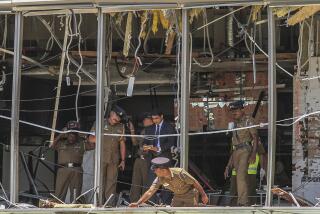In Sri Lanka, a Call to Arms
- Share via
VALAICHCHENAI, Sri Lanka — On Fridays after dusk, groups of young Muslim men gather in the palm-fringed garden of the town’s main mosque.
Once they talked about work or played carom -- the local version of pool -- in an adjoining room of the 80-year-old mosque. But these days, they talk about how to counter the growing power of ethnic Tamil rebels in the eastern part of this island nation off India’s southern tip.
After nearly two decades of civil war, the government and the rebels struck a deal last year to grant limited self-rule to Tamil areas of Sri Lanka. And police intelligence reports say Muslim extremists are slowly prevailing upon their previously quiet community to prepare for armed resistance.
Most Muslims live in the east, and they strongly oppose a Tamil effort to include them in an autonomous zone that the rebels are negotiating with the government, which is dominated by the island’s Sinhalese majority who are largely Buddhist.
Surrounded by the sea on one side and rebel guns on the other, some among Sri Lanka’s 1.3 million Muslims are openly debating the need to take up arms against the militants among the 3.2 million Tamils.
“If you ask me whether I will pick up an AK-47 to fight for our rights, I may tell you, ‘Not yet.’ But if I am pushed one inch further, I will,” said Abdul Naser, 29, who buys tuna from fishermen and sells the catch to wholesale markets in Colombo, Sri Lanka’s capital.
Muslims, who are mostly businessmen and traders, fear being made second-class citizens under a Tamil administration.
They also don’t trust the Tamils, who are mostly Hindus. They say rebels have systematically killed Muslims, including an August 1990 massacre of 130 people at two mosques on the same day, and point to the guerrilla army’s expulsion of 100,000 Muslims from the Jaffna Peninsula that same year. (Tamil rebels, a secular group, were known for attacking civilian targets, including Buddhist shrines.)
On the edge of some Muslim-majority villages, armed Tamil guerrillas check every traveler and collect taxes. In July, when the rebels called for a strike, some Muslim traders ignored it and two Muslim-owned shops were set afire.
Some Muslims want the government to create a separate Muslim administrative district, an idea opposed by the rebels. The government, worried about alienating the Muslims, says it is trying to convince the rebels that the Muslims be allowed to share power with Tamils in the envisaged administration.
“We have faith in our political leaders that they will not allow” Tamils to become the sole local power, said Mohammed Aliyar, 30, a teacher. “But if they fail, many young Muslims will pick up the gun.”
A police intelligence report, part of which was seen by the Associated Press, says Islamic militants have already set up two training bases.
No one in the rice-growing area acknowledged the bases, and many people looked away when asked about them.
The report says there has not yet been any serious weapons training at the bases, adding the emphasis now is on raising the anger level of Muslims and mentally preparing themselves for jihad, or holy war.
A nation of 19 million people, Sri Lanka has been relatively peaceful since February 2002, when Norwegian mediators arranged a cease-fire after a 19-year insurgency by Tamils that took more than 60,000 lives.
The rebels and government have held six rounds of peace talks, which have included a rebel promise to drop its campaign for an independent state in return for creation of an autonomous zone where Tamils would have broad powers over their everyday lives.
But the rebels suspended talks in April -- two months before local elections were scheduled -- demanding to be recognized as the interim administrators of the entire northeast pending a final accord.
Rebel maps of the proposed zone include all the Muslim-majority areas in the east.
In Colombo, the leader of a key Muslim political party said he opposes violence but worries about young Muslims resorting to force if Muslims have to live in a Tamil-governed area.
“We are aware of the risk. That is the reason we want to use all our means to convince the government that it should never sacrifice the interest of the Muslims,” said Hashan Ali, secretary-general of the Sri Lanka Muslim Congress.
His party has 12 seats in the 225-member parliament and is a coalition partner of Prime Minister Ranil Wickremasinghe, who has only a two-seat majority. The government could fall if Ali’s party withdrew its support. That could be a blow to peace efforts.
Wickremasinghe’s agreement to create a Tamil zone is opposed by many among Sri Lanka’s 14 million Sinhalese.
British colonial rule ended in 1948 and the Sinhalese had long resented a perceived preferential treatment given to the Tamils. The Sinhalese believed that their superior numbers gave them the right to rule, and they have dominated the government and the army ever since.
Wickremasinghe’s government says it is trying to persuade the rebels to share power with Muslims by allowing appropriate Muslim representation in the proposed administration.
Rebel leaders say that they have nothing against Muslims, and that Tamils and Muslims should coexist and live together in a rebel-run northeast.
But Ali said Muslims would never allow the rebel movement to run their affairs. “We know them too well,” he said.
More to Read
Sign up for Essential California
The most important California stories and recommendations in your inbox every morning.
You may occasionally receive promotional content from the Los Angeles Times.










